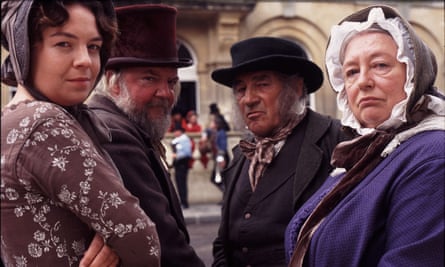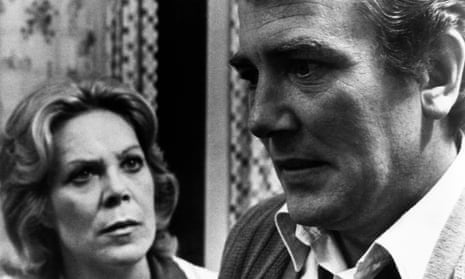As a passionate lover of football, in particular of Liverpool FC, Ted Whitehead, who has died aged 89, would have readily admitted that his career as a writer was a game of two halves. In the first, under the name EA Whitehead, he was an admired stage dramatist who wrote a number of scorching studies of the sex war for the Royal Court theatre including, in 1972, Alpha Beta starring Albert Finney and Rachel Roberts. In the second half he became a prolific writer of TV drama whose output included adaptations of Fay Weldon’s The Life and Loves of a She-Devil and The Cloning of Joanna May, as well as contributions to long-running series such as Cracker.
While brilliantly acted by Finney and Roberts, Alpha Beta went beyond the study of two trapped individuals to offer a critique of working-class morality, western European monogamy and the restrictive influence of Catholic dogma. Perhaps confirming DH Lawrence’s argument that marriage is more of a duel than a duet, the play showed its lasting power when revived by the Finborough theatre in 2015.
Moving to television writing from 1980, Ted made fine adaptations of Thomas Hardy novels – Tess of the D’Urbervilles in 1998 and The Mayor of Casterbridge in 2003 – that captured the ominous sense of tragedy hanging over rural Wessex. His dramatisations of the two Weldon novels capitalised on his lifelong sympathy with strong, resilient women. As well as Cracker, he applied his professional skill to writing episodes of TV series including World’s End (1981), The Detective (1985), The Free Frenchman (1989) and Ruth Rendell Mysteries (1998).

Born in Liverpool, to Catherine (nee Curran), a factory worker, and Edward Whitehead, a compositor, Ted (Edward) was educated at St Francis Xavier’s Jesuit college in Liverpool. From there he got a scholarship to Christ’s College, Cambridge, where, as a working-class boy from Liverpool, he felt totally out of place. He said that all he learned about English literature could have been crammed into one year.
Graduating in 1955, after national service and marriage in 1958 to Kathleen Horton he was variously a milkman, postman, bus conductor and salesman. In 1965 he moved on to become an advertising copywriter, but it was not until 1971 – at the relatively late age of 38 – that he turned to playwriting. Legend has it that his first play, The Foursome, was one of the few ever produced by the Royal Court that arrived through the post. Presented at the Theatre Upstairs before transferring to the West End, it made an immediate impact. An account of two Liverpool boys who take a couple of girls they have picked up to the beach, it was brutal, funny and unflinching. Today it would be classified as a study of toxic masculinity; in 1971 it seemed simply an honest portrayal of teenage trauma.
Ted made an even bigger impression with Alpha Beta. Clearly owing a debt to Strindberg’s Dance of Death, the play charted the decline and fall, over a period of nine years, of a Liverpool marriage. His later studies of domestic complexity were good without making as much noise in the world. The Sea Anchor (1974) captured the private anxieties of a foursome awaiting the arrival of a daredevil who has made a solo voyage across the Irish Sea. Mecca (1977) showed a group of English tourists importing their marital conflicts to Morocco. The Man Who Fell in Love With His Wife (1984) – which Ted adapted from his first TV drama, Sweet Nothings (1980) – is almost a reverse of Alpha Beta in that it depicts a female spouse’s desperate desire for freedom. The odd one out among these plays was Old Flames (1976), introducing female cannibalism, which as a critic I vehemently attacked: a fact that never dented my later friendship with Ted.

After his first marriage ended in divorce, in 1976 he married the script editor Gwenda Bagshaw (in spite of her being a devoted Everton supporter). He worked as drama critic for the Spectator for a couple of years before carving out a highly successful career in television. However he will always be remembered as one of British theatre’s best analysts of the enervating paralysis of holy deadlock.
As a fellow Chiswick resident, I got to know him in his later years and was always struck by his absolute honesty. He remained implacably true to his Liverpool working-class roots, and was always direct and uncompromising. If you found him drinking outside one of his favourite riverside pubs, you could stop to chat about the topics of the day – from the Catholicism he had rejected to his disillusion with the Labour party – unless it was five o’clock on a Saturday afternoon, when his ear would be clamped to a radio as he listened to the football results with monastic fervour.
He is survived by Gwenda, by Helen and Kate, the daughters of his first marriage, and by three grandchildren.

Comments (…)
Sign in or create your Guardian account to join the discussion